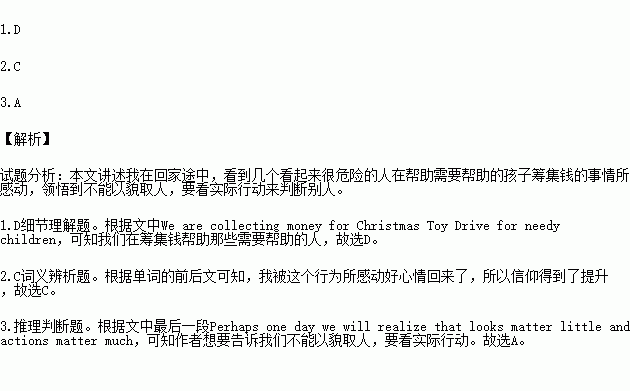题目内容
I was driving home the other day on a sunny afternoon. I had a smile on my face as I sang along to the songs on the radio. It was such a beautiful day that I felt full of happiness. My good mood ended, however, when the radio station took a news break between songs. Then suddenly I found myself listening to another story of a rich famous man who had broken the law. I shook my head as I came to a red traffic light.
As I pulled to a stop, I noticed four leather?jacketed bikers. They were standing in the middle of the road with two on either side of the light. They looked rough and dangerous, but as I got closer I noticed each one was holding their helmet(头盔) in their hands. I rolled down my window as one came up to my car. “We are the Brother of the Wheel,” he said. “We are collecting money for Christmas Toy Drive for needy children.” As I pulled a dollar out of my wallet I looked past his beard and into his eyes. They shined with goodness and kindness that came right from his soul. I dropped the money in his helmet and waved to the other bikers as I drove off. My good mood had returned. My faith in mankind had been bolstered. And I remembered once again never to judge people by their appearance.
Our society often judges books by their covers but God reads what is written in our hearts and souls. Perhaps one day we will all learn to see the world through the same eyes. Perhaps one day we will realize that looks matter little and actions matter much.
1.What were the four bikers doing at the traffic lights?
A. Having a bicycle race in the street.
B. Selling helmets to the passers?by.
C. Preparing for Christmas holidays.
D. Raising money to help kids in need.
2.What does “bolstered” in the second paragraph probably mean?
A. Destroyed B. Exploded
C. Improved D. Reduced
3. The writer wants to tell us that we should ________.
A. judge others by their actions
B. have faith in young people
C. change our attitude to society
D. manage to help others in need
 阅读快车系列答案
阅读快车系列答案
